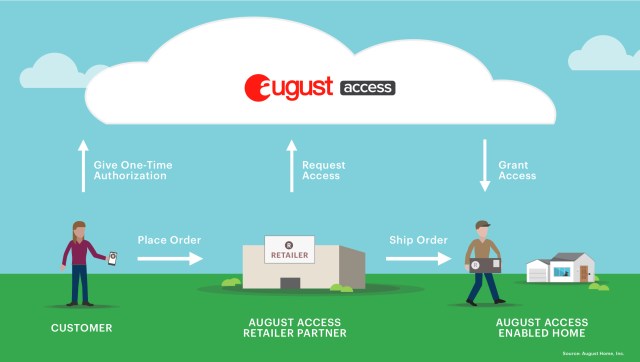Earlier this week, August announced a new line of locks and a doorbell.
Normally I’d say a product lineup refresh would have been the biggest announcement of the week for a Silicon Valley hardware startup, but that might not be the case here. That’s because this week the company also announced they had started a trial with Walmart and crowdsource-delivery startup Deliv to deliver direct-to-fridge groceries.
Now, why do I think this is potentially even bigger news than new locks? While I’m as interested as the next guy in new locks and doorbells, these products are just generational upgrades. That they came the same week that Nest also announced its doorbell tells you just how competitive and saturated the smart security and access market is becoming.
What the Walmart news is a potential new business model for Walmart, Deliv, and August, one which enables new same-day, value-added delivery service not only to the consumer’s home but directly into the home. In an industry that is desperate for differentiation in an Amazon world, this is a big deal for all three companies.
So how will it work? Here’s how they explain it on the Walmart blog:
Here’s how the test will work: I place an order on Walmart.com for several items, even groceries. When my order is ready, a Deliv driver will retrieve my items and bring them to my home. If no one answers the doorbell, he or she will have a one-time passcode that I’ve pre-authorized which will open my home’s smart lock. As the homeowner, I’m in control of the experience the entire time – the moment the Deliv driver rings my doorbell, I receive a smartphone notification that the delivery is occurring and, if I choose, I can watch the delivery take place in real-time. The Deliv associate will drop off my packages in my foyer and then carry my groceries to the kitchen, unload them in my fridge and leave. I’m watching the entire process from start to finish from my home security cameras through the August app. As I watch the Deliv associate exit my front door, I even receive confirmation that my door has automatically been locked.
You can see a video explaining the concept here:
On the August side, this trial is utilizing the August Access platform, which integrates their access products like smart locks directly with service providers to enable the service provider to provide home delivery and concierge services (like house cleaning or dog walking) when the consumer is not home.
When I wrote about August Access in 2015 for Forbes, I said, “So what does this mean and why would I want to let people I don’t know into my house using a smart lock? While not everyone would want to or even need to allow a service provider access to their home, if you’re like me, now and then you need someone to take the dog out or clean the house. Because of this, the ability to give temporary access to an approved service provider makes lots of sense.”
 For Walmart, this provides a final last-100-feet solution that could be valuable for consumers. The challenge will be taking this offering and scaling it to a wider audience. In Silicon Valley (where the trial is taking place), smart locks are probably pretty common. In Arkansas, probably not as much. One eventual solution could involve Walmart subsidizing the cost of a smart lock when delivery customers sign up for a year of home delivery.
For Walmart, this provides a final last-100-feet solution that could be valuable for consumers. The challenge will be taking this offering and scaling it to a wider audience. In Silicon Valley (where the trial is taking place), smart locks are probably pretty common. In Arkansas, probably not as much. One eventual solution could involve Walmart subsidizing the cost of a smart lock when delivery customers sign up for a year of home delivery.
Lastly, there is the question of whether consumers want delivery people to come into their home. Further complicating the concept is Deliv utilizes a crowdsourcing model, meaning it’s essentially an Uber for home delivery, which means you might get part-time students or retirees looking to supplement their fixed income as a home delivery driver entering your home when you’re not there.
The trial is currently taking place with existing August customers in northern California, a crowd that might be more comfortable with both technology and strangers walking into their home. I’ll be interested to see how it performs once they expand beyond early adopters in other geographies.
And who knows: Maybe the next idea is the ability to keep an eye on visitors to the home with a smart home camera or fridge cam.
Could it be those are in August’s next product introduction?



